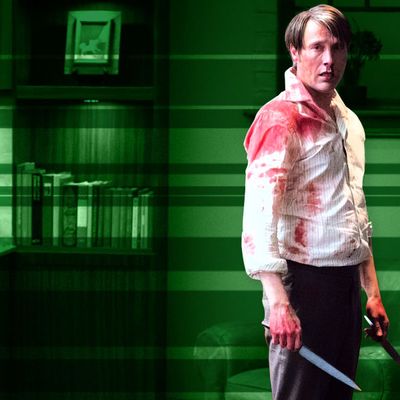
All this week, we’re presenting our Vulture TV Awards, honoring the best in television from the past year. We’ve already singled out Amy Schumer, Julianna Margulies, and others actors for their solid performances, and also gave props to director Cary Fukunaga for a particularly wonderful scene from True Detective. Up next: a look back at five of the best episodes from the past year of television, as selected by Vulture television critic Matt Zoller Seitz, including an upstart at the top spot.
TV Week Award Winners
- Best Comedy Performer, Female — Amy Schumer
- Best Comedy Performer, Male — Jon Benjamin
- Best Teen Show — The Fosters
- Best Child Actor — Maisie Williams
- Best Couple — The Americans’ Philip and Elizabeth
- Best Drama Performer, Male — Matthew Rhys
- Best Drama Performer, Female — Julianna Margulies
- Best Directed Scene — True Detective’s “Who Goes There” montage
- Best Episode — Hannibal season 2 finale
- Best TV Villain — Walter White
- Best Death — Click to find out [warning: spoilers]
- Best Network — FX
- Best Late-Night Moment — Colbert Report
- Best Dressed Characters — Scandal and others
- Best Dialogue — Sherlock
- Best Comedy Sketch — Inside Amy Schumer
- Best Plot Twist — House of Cards [warning: spoilers]
1. Hannibal, “Mizumono”: Written by Steve Lightfoot and Bryan Fuller, Directed by David Slade
This show demonstrates so much formal daring each week that even the most audacious innovations and flourishes in other live-action series seem tame in comparison. The season-two finale is one of the greatest hours of TV it has ever been my pleasure, or horror, to sit through. If you have never watched Hannibal, you’ll think it absurd that I briefly considered making this a list of five Hannibal episodes. If you have seen the show, you get it (and if this were a list of five Hannibal episodes, the other four would be “Shiizakana,” “Naka-Choko,” “Tome-wan,” and “Sakizuke”). I won’t describe the finale or the show in detail for the many TV viewers who have yet to sample Hannibal (if you don’t mind spoilers, you can read my appreciation of the show’s second season here), but I would urge anyone who hasn’t done so yet to commit to a full two-season binge immediately.
2. Mad Men, “The Strategy”: Written by Semi Chellas, Directed by Phil Abraham
A nearly perfect hour of television (well, 42 minutes, minus ads), this Mad Men episode showcased one of the great Don-and-Peggy moments, a rapprochement-as-slow-dance to Frank Sinatra’s “My Way,” and it boasted all manner of emotional and visual grace-notes, not the least of which was that slow pull-back from the makeshift nuclear family of Peggy, Don, and Pete eating in that Burger Chef window. But it was also a marvel on a level of basic storytelling craft. Every scene and line was pitched just right and ended when it should have. And as I wrote in my recap, it “does a remarkable job of unifying itself around a particular idea — the gap between reality and socially constructed fantasy — without making itself seem too obviously organized.”
3. The Good Wife, “A Few Words”: Written by Rosemary Rodriguez, Directed by Leonard Dick
This episode was about Alicia Florrick learning to use the power she’d accumulated over The Good Wife’s four-and-a-half seasons — to control her destiny, as she put it, and to figure out the extent to which her feelings for Will were holding back her development, and what, if anything, to do about it. “I want a happy life,” she said, “And I want to control my own fate.’ The long road was remembered through deft flashback storytelling, which cut between Alicia’s preparation to deliver a speech about being an “opt-out mom” at an American Bar Association Conference and her experience in the immediate aftermath of her husband’s scandal, when she did and said whatever she needed to do and say in order to recover and rebuild. On top of all that, the episode was genuinely funny (e.g., the anti-Semitic bear; Clarke’s irritation at the taxicab video) and wise about awkwardness between exes (Alicia and Will’s coffee-shop encounter where they’re not quite facing each other). A pantheon episode.
4. Louie, “Elevator, Part 6”: Written and directed by Louis C.K.
Louie’s breakup with his girlfriend Amia (Eszter Balint) was the heart and soul of this episode, and its excellence was bound up in its minimalist direction; but it also contained that amazing sequence showing Louie’s (maybe unnecessary) rescue of his ex-wife and daughter during a hurricane, which sets up the combination of male entitlement and deep romantic depression that leads into the attempted rape in the next episode, the controversial “Pamela Part 1.” Very few half-hour shows manage to seem so epic and intimate, so serious and painfully funny, in the same time slot.
5. Mad Men, “Time Zones”: Written by Jonathan Igla and Matthew Weiner, Directed by Scott Hornbacher.
A study in malaise, this Mad Men episode was arguably the most deceptive in the first half of the show’s final season. It was possible to watch “Time Zones” the first time and think it uneventful and perhaps uninteresting, then revisit it and realize that it was just operating on a very subtle wavelength, setting up rhyming situations, gestures, and lines of dialogue that didn’t form into a pattern until you’d had a few hours (or days) to really live with it. Which isn’t to say it stinted on Big Moments: From the opening shot of Freddy Rumsen delivering the Acutron copy straight into the camera to Don and Megan’s Wong Kar-wai slow-motion meetup at the Los Angeles airport to the final shot of a miserable Don shivering on the balcony of his New York apartment, this was an hour filled with moments so potent that they seemed to capture the essence of the show, or some prismatic shard of it, anyway.





